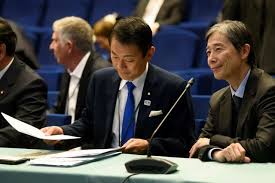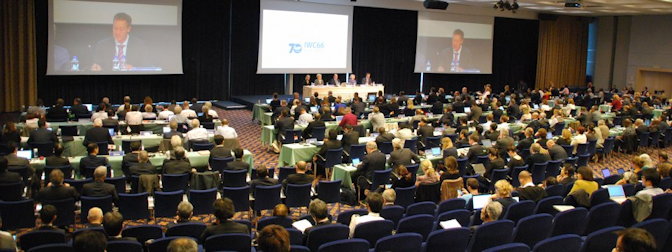Atlantic Whale Sanctuary Again Rejected At IWC'70 |
Edited by Graham J Clarke - Whales In Danger
PORTOROZ, Slovenia, October 31, 2016 (ENS) - A minority of 24 Member governments of the International Whaling Commission (IWC) have again succeeded in defeating a proposal for a South Atlantic Whale Sanctuary (SAWS) while 34 governments who voted to create the sanctuary failed to reach the 75% vote necessary to adopt it.
 Japan Continues to Manipulate the IWC - Photo by Jure Makovec/AFP |
| Tweet |
Held on the occasion of the IWC's 70th anniversary (October 24-28) in Portoroz, a town on Slovenia's Adriatic coast, about 400 participants representing member and nonmember governments, academia, intergovernmental and nongovernmental organizations, indigenous groups and the media, attended the biennial meeting.
IWC-70 addressed a proposal for a South Atlantic Whale Sanctuary; aboriginal subsistence whaling; socioeconomic implications and small-type whaling; cetacean status and health; unintended anthropogenic impacts; whale killing methods and welfare issues; the Commission budget for 2017-2018; and the shape of the IWC into the future.
Several resolutions were also considered on: enhancing the effectiveness of the IWC; improving the review process for whaling under special permit; cetaceans and ecosystem functioning; the creation of a fund to strengthen the capacity of governments of limited means to participate in the work of the IWC; food security; and the Critically Endangered vaquita.
All these resolutions, except the one on food security, were adopted; the proposal on the South Atlantic Whale Sanctuary, SAWS, was rejected.
South Atlantic Ocean Sanctuary Rejected... Again
Brazil's Environment Minister Sarney Filho, speaking for the sanctuary proposal's co-sponsors: Brazil, Gabon, South Africa, Argentina and Uruguay, called the SAWS initiative "a mature proposal," which has been revised and refined over many years. While Filho dismissed concerns about food security impacts, saying the sanctuary would benefit coastal states he emphasized broad support, including more than one million signatures from civil society.
Noting the IWC's 70th anniversary and 15 years that have passed since the South Atlantic Whale Sanctuary was first proposed, Filho said it was "high time" for the IWC to take this crucial step.
India, Mexico, Monaco, the United States, Chile, Australia, and the Netherlands, on behalf of the European Union, supported the sanctuary proposal.
South Africa stressed the positive economic benefits a sanctuary would bring, such as poverty relief for communities where new whale watching opportunities could help replace lost mining jobs, and spoke of the need to protect whales on the high seas.
Gabon dismissed as myth the idea that whales are "eating all the fish," noting that the whales feed in higher latitudes, and pointing to overfishing, especially illegal, unreported and unregulated fishing, as the reason for fish declines. He praised the fruitful collaboration between South America and Africa on the sanctuary proposal.
Opposed were: Japan, Antigua and Barbuda, Guinea, Iceland, Norway, Russia, and South Korea.
Japan repeated they believe the sustainable use of marine living resources is consistent with environmental protection and since the sanctuary is based on the idea of total protection of whales, his country is not able to support the proposal, suggesting instead regional cooperation under a memo of understanding. South Korea agreed, as did Russia.
Antigua and Barbuda remarked that neither proponents nor opponents of the sanctuary have presented any scientific evidence in support of their positions, and suggested asking the Scientific Committee for a comprehensive review of whether or not sanctuaries are a useful management tool.
 IWC'70 Meeting - Photo courtesy IWC |
Guinea said the sanctuary is not needed, as the moratorium already provides for complete protection.
The World Cetacean Alliance emphasized whale watching job creation and income potential, citing southern right whale-related tourism in Patagonia.
The International Union for Conservation of Nature, IUCN, said a motion at the recent 2016 World Conservation Congress in support of the SAWS received support from 95 percent of governments and 98 percent of NGOs in attendance.
Copyright © Environment News Service All rights reserved.
|
|||||||||||||||